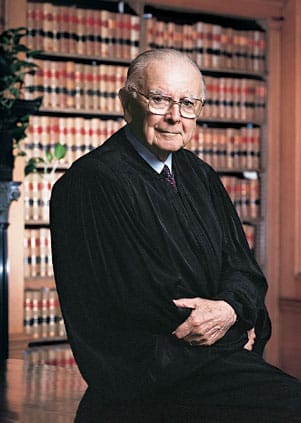As the intellectual leader of the movement towards expanded individual and civil rights, Chief Justice of the U.S. Supreme Court William Brennan fundamentally changed the court’s approach toward the Constitution. After his death in July 1997, he was called “probably the most influential justice of the century” by Justice Antonin Scalia. Brennan served the court for a near record-breaking three decades.
When Brennan graduated with a degree in economics in 1928 from Wharton, the personable Newark, NJ, young man embarked on a journey that would lead him to become one of the most revered and dominant U.S. Supreme Court justices.
After law school at Harvard, Brennan entered the Army during World War II, rising to Colonel in 1945. Between 1949 and 1951 he was a judge on the New Jersey Superior Court and then that state’s Supreme Court before being appointed by President Dwight Eisenhower, a Republican, in 1956 to the U.S. Supreme Court.
Brennan was the quintessential liberal jurist for causes ranging from civil rights to opposing the death penalty. Harvard Law Professor Lawrence Tribe wrote that Brennan was the “principal architect of the nation’s system for protecting individual rights.” He continued, “Intellect alone could never have achieved so much, though Brennan’s intellectual brilliance and analytical acumen were indispensable. What drove him were passion and compassion, insight and empathy, and a dream of a Constitution of, by, and for the people.”
By the time he retired in July 1990, Brennan had ruled in 1,360 opinions, surpassing all but one justice in the court’s history. His vital cases included New York Times v. Sullivan, which established the actual malice standard of which press reports could be considered to be defamation and libel (allowing free reporting of civil rights campaigns in the southern U.S.), and Furman v. Georgia, which ruled application of the death penalty required consistency (resulting in the suspension of the death penalty from 1973 to 1976).


























